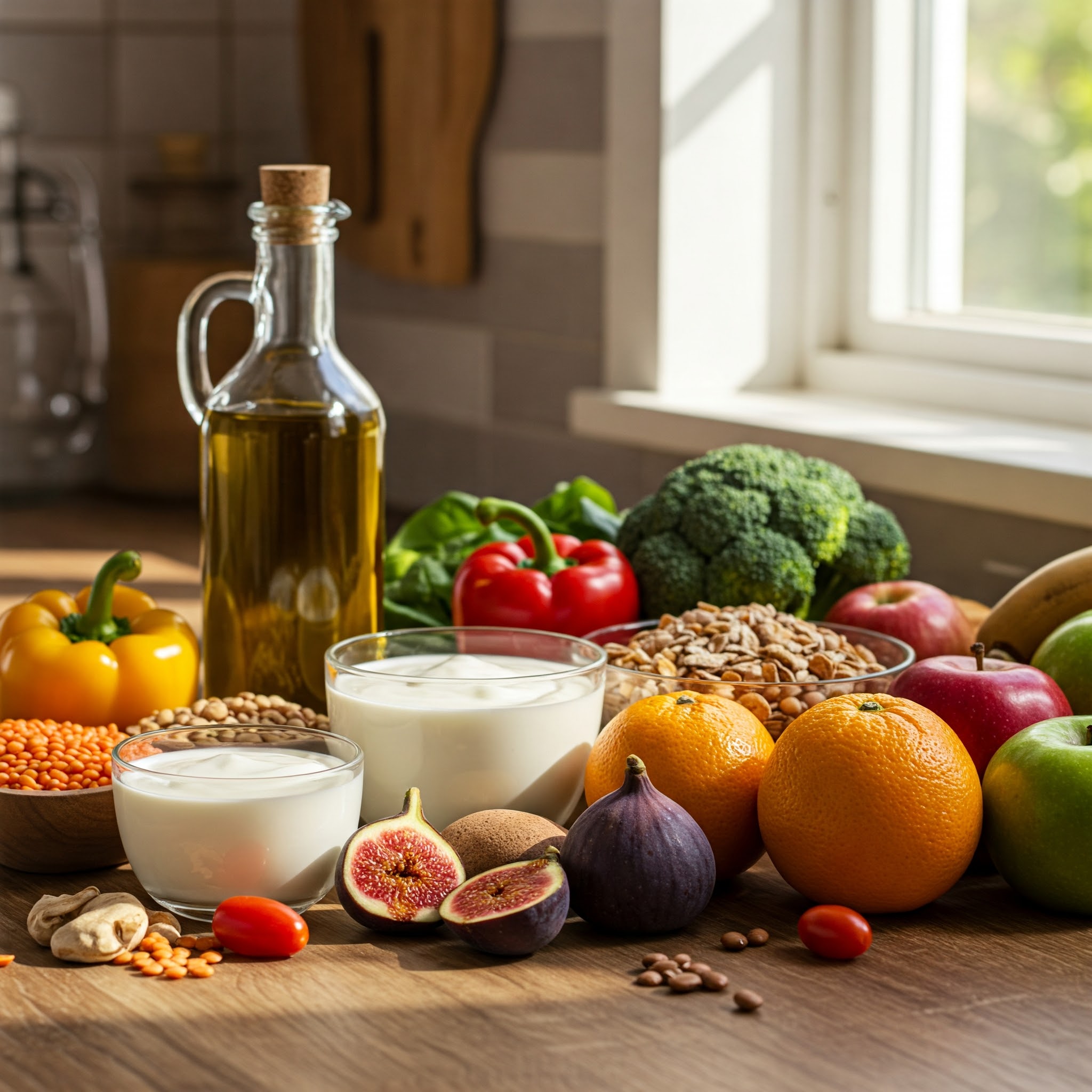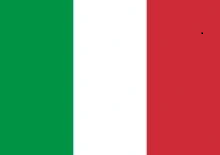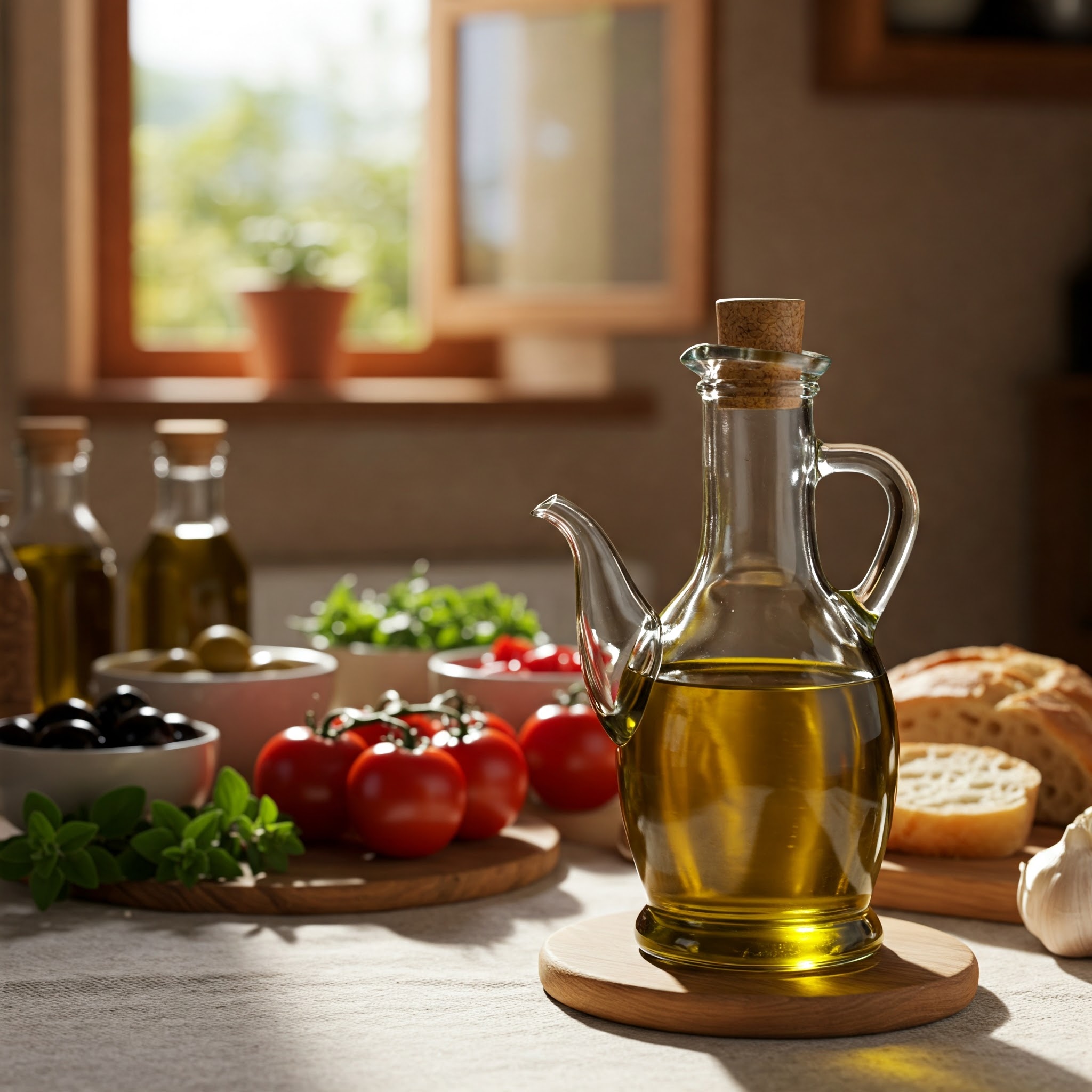In 2010, the Mediterranean diet snagged UNESCO’s Intangible Cultural Heritage of Humanity status—because apparently, it’s not just your taste buds that think it’s special. And it isn’t just about eating; it’s about living. Packed with veggies, fish, dairy, and just a whisper of red meat and sweets, Med-diet is a recipe for dodging cancer, cardiovascular diseases, and even that post-dinner regret when you’ve eaten too much cake.
Pyramid Power: The Mediterranean Way to Eat
The Mediterranean diet follows the so-called food pyramid, comprising several food combinations. But it is not just a boring hierarchy of food groups; it’s a guide to assembling meals that are balanced, healthy, and delicious. It’s a master plan for balanced eating characterized by the consumption of a wide variety of foods, including extra-virgin olive oil, legumes, cereals, nuts, fruits, vegetables, dairy products, and fish.
This pyramid thus includes all food groups in just the right proportions, making it flexible enough for everyone, from expectant moms to picky toddlers, and even your neighbor with “unique dietary preferences.”
The idea is to mix and match foods from various levels of the pyramid, creating meals that are both Instagram-worthy and scientifically approved! Whether you’re a stressed-out adult, an energetic kid, or a mom-to-be, the pyramid flexes to meet your needs.
Superpowers on a Plate
Why has the Mediterranean Diet earned its crown as one of the healthiest dietary patterns on the planet?
Several studies demonstrated that this nutritional pattern has lipid-lowering, anticancer, antimicrobial, and anti-oxidative effects. So It’s all about those antioxidants and anti-inflammatory nutrients.
Science tells us that sticking to the Med Diet can help reduce the risk of chronic illnesses like heart disease, diabetes, and even cancer. Think of it as giving your cells a spa day—fighting off inflammation, repairing DNA damage, and keeping rogue cell proliferation (aka cancer) at bay.
Moreover, the Mediterranean diet is considered environmentally sustainable!
Mediterranean diet components
The mediterranean diet is characterized by high consumption of fresh fruit, vegetables, cereals, legumes, moderate quantity of fish, eggs, cheese, dried fruit, nuts and low amounts of red meat and processed food. Here’s how it’s structured:
- At the base of the food pyramid: Plenty of vegetables, some fruit, and whole grains.
- Moving up: Low-fat dairy products (like yogurt), recommended in 2-3 servings per day.
- The king of condiments: Extra virgin olive oil is the go-to choice, best used raw (around 3-4 tablespoons per day), along with garlic, onions, spices, and herbs instead of salt. Other healthy fats come from nuts and olives, with 1-2 servings per day.
- Higher up the pyramid: Foods to enjoy weekly, mainly protein sources. Prioritize fish and legumes (at least two servings per week each), poultry (2-3 servings per week), eggs (1-4 per week), and cheese (no more than two servings).
- At the top: Foods to consume in moderation. Red meat should be limited to two servings or less per week, while processed meats (like cold cuts and cured meats) should be enjoyed even less frequently (one portion per week or less).
- And finally, sweets: The less, the better!
To understand what a recommended portion size looks like, we need to consider both the type of food and the child’s age. The CREA Food and Nutrition Guidelines for a Healthy Diet provide some useful recommendations in this regard.
- For primary school children, a portion of pasta, rice, or other cereals is 70g, increasing to 100g in secondary school, to be offered twice a day.
- The recommended portion of vegetables is 150g once a day for primary school children and 200g twice a day in secondary school.
- Legumes go from 90g fresh, three times a week in primary school, to 120g with the same frequency in middle and high school.
- Fish portions increase from 80g three times a week for younger children to 150g with the same frequency for older students.
The Mediterranean Diet: More Than Just Olive Oil!
But the Mediterranean Diet isn’t just about swapping out burgers for hummus or turning your pantry into an olive oil shrine—it’s a lifestyle. That’s why, in addition to specific food choices, there are key aspects that should never be overlooked. These include daily physical activity, sufficient rest, proper hydration, and a focus on conviviality, seasonality, and sustainability.
As a UNESCO Intangible Cultural Heritage, the Mediterranean diet represents a wealth of traditional knowledge that “involves a set of skills, knowledge, rituals, symbols and traditions concerning crops, harvesting, fishing, animal husbandry, conservation, processing, cooking, and particularly the sharing and consumption of food. Eating together is the foundation of the cultural identity and continuity of communities throughout the Mediterranean basin”.
The Mediterranean diet is thus also about community, tradition, and living your best, healthiest life: it is a delicious harmony of tradition, community, and science-backed health benefits!

REFERENCES
- Mentella MC, Scaldaferri F, Ricci C, Gasbarrini A, Miggiano GAD. Cancer and Mediterranean Diet: A Review. Nutrients. 2019 Sep 2;11(9):2059. doi: 10.3390/nu11092059. PMID: 31480794; PMCID: PMC6770822.
- Kiani AK, Medori MC, Bonetti G, Aquilanti B, Velluti V, Matera G, Iaconelli A, Stuppia L, Connelly ST, Herbst KL, Bertelli M. Modern vision of the Mediterranean diet. J Prev Med Hyg 2022;63(suppl.3):E36-E43.https://doi.org/10.15167/2421-4248/jpmh2022.63.2S3.2745
- Mediterranean diet – https://ich.unesco.org/en/RL/mediterranean-diet-00884
- Rossi, L.; Ferrari, M.; Ghiselli, A. The Alignment of Recommendations of Dietary Guidelines with Sustainability Aspects: Lessons Learned from Italy’s Example and Proposals for Future Development. Nutrients 2023, 15, 542. https://doi.org/10.3390/nu15030542
- Rossi Laura , Martone Deborah , Piccinelli Raffaela , Buonocore Pasquale , Ghiselli Andrea , the Working Group on Pediatric Nutrition of Italian Dietary Guidelines , Caroli Margherita , Giovannini Marcello , Morino Giuseppe , Scaglioni Silvia , Vania Andrea , Verduci Elvira. Considerations for the translation of nutrient recommendations as dietary plans for infants, children, and adolescents as reported in Italian Guidelines for healthy eating. Front. Nutr., 25 August 2022. Sec. Nutrition Methodology. Volume 9 – 2022 | https://doi.org/10.3389/fnut.2022.935963



